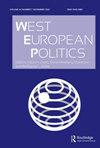Differentiated implementation and European integration: the development of EU food quality labelling
IF 4.5
1区 社会学
Q1 POLITICAL SCIENCE
引用次数: 1
Abstract
Abstract The article examines how differentiated national implementation of EU policies affects later European integration – whether it leads to renewed unified vertical integration, differentiated integration, the status quo or renationalisation. It examines the case of geographical indications (GIs), an EU labelling system for food and drink based on place of origin and processes of production. Despite features such as diverse national interests and gastronationalism, differentiated implementation has resulted in renewed unified vertical integration. The article identifies three processes: EU legislative requirements encouraging the establishment of producer groups; European Court of Justice decisions which gave priority to quality over cross-border trade; the use of free trade negotiations to alter EU rules. While the integration outcomes are those expected by neo-functionalist analyses, the processes are more institutionally-based. Differences in implementation may aid rather than hinder further integration due to institutional features of EU legislation and decision making.差异化实施与欧洲一体化:欧盟食品质量标签的发展
本文章由计算机程序翻译,如有差异,请以英文原文为准。
求助全文
约1分钟内获得全文
求助全文
来源期刊

West European Politics
POLITICAL SCIENCE-
CiteScore
10.00
自引率
7.10%
发文量
58
期刊介绍:
West European Politics (WEP)has established itself as one of the most authoritative journals covering political and social issues in Western Europe. It has a substantial reviews section and coverage of all national elections in Western Europe. Its comprehensive scope, embracing all the major political and social developments in all West European countries, including the European Union, makes it essential reading for both political practitioners and academics.
 求助内容:
求助内容: 应助结果提醒方式:
应助结果提醒方式:


